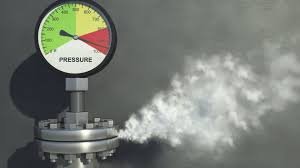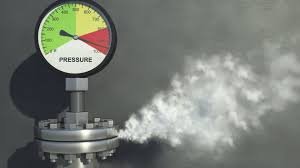Do you ever have days when your mind and body are feeling a little off from what you consider your “norm?” On those days, are you able to detect something isn’t quite right?
Those around me may not, but I consider myself fairly low-keyed. But then there are days when I have the feeling something is going to go really, really wrong. Fortunately, that isn’t everyday.
While searching the internet one day last week, I came across an article on Forbes.com that was addressing stress and pressure. The author of the article, Amy Morin, had interviewed Hendrie Weisinger, Ph.D., the author of “Performing Under Pressure: The Science of Doing Your Best When it Matters Most.” Weisinger broke down the difference between stress and pressure in these words: “Stress refers to the situation of too many demands and not enough resources – time, money, energy – to meet them. Pressure is a situation in which you perceive that something at stake is dependent on the outcome of your performance.”
The author gave examples such as “stress may involve a variety of problems that lead to feelings of overload. A meeting that runs late, a long list of emails that need responses, and several looming deadlines that need to be addressed may cause a fair amount of stress. But that doesn’t mean you’re under pressure.”
She went on to explain that “pressure involves feelings — often of an anxious and fearful nature — of a ‘do or die’ type situation. When you’ve only got one shot to get it right — like being at bat in the ninth inning of the World Series with the tying run in scoring position, or a presentation to a client or job interview — you’ll experience pressure.”
Those of us who don’t have the Ph.D. pedigree, it is easy to get these terms mixed up even though they mean two different things. Pressure refers to external demands or expectations placed on a person, such as deadlines at work, family obligations, or outside expectations. Stress, on the other hand, is the internal reaction to that pressure. It’s how our body and mind respond — emotionally, mentally, and physically — when we feel overwhelmed or unable to meet those external demands.
In his book, Weisinger recommends that any time you feel the “heat,” ask yourself, “Am I feeling overwhelmed by the demands upon me, or do I feel I have to produce a specific result?” If your answer is the former, a feeling of being overwhelmed, too many demands and not enough resources, you are stressed. If you are entering into a situation in which you feel you have to deliver the goods, that’s pressure.
Not everyone reacts to pressure with stress; some may thrive under tight deadlines, while others may feel anxious or exhausted. Understanding the difference between the two can be crucial for managing your mental health. While pressure is often unavoidable, learning how to manage our internal stress response — through rest, support, or healthy coping strategies — can make a significant difference in overall well-being.
Stress is a state of mental or emotional strain resulting from demanding circumstances. By not understanding the difference, we’re at risk of making small annoyances feel like a pressure situation. Believing you must be successful every time - that is pressure. Not having time or money to do something correctly is stressful.
Examples of Pressure
These situations involve external demands or expectations that push you to act or perform:
• Job interview: You feel the need to make a good impression in a limited time.
• Exams: You know you need to study and perform well to pass.
• Sports competition: You’re expected to win or beat your personal record.
• Public speaking: All eyes are on you and you’re expected to deliver confidently.
• Performance reviews: Your boss evaluates how well you’re doing — and maybe whether you’ll get a raise.
Pressure isn’t always negative. It can boost motivation and sharpen focus when handled well.
Examples of Stress
These are personal reactions that may result from too much pressure, or from other emotional or physical strain:
• Chronic sleep loss: You’re exhausted and start to feel anxious and irritable.
• Relationship conflict: Constant arguing creates emotional strain.
• Financial troubles: Bills pile up and you feel overwhelmed and helpless.
• Overloaded schedule: Too many responsibilities leave you drained and disorganized.
• Workplace tension: You feel burnt out from daily demands, and your mental health suffers.
Stress can affect your body, mood, and ability to function. Unlike pressure, it’s a signal that things might need to change.
In a newspaper newsroom, one can be both stressed out and pressured. That is called “Stressure.” When I get my Ph.D., I will write a book and attempt to explain it.
— Keith Lippoldt





